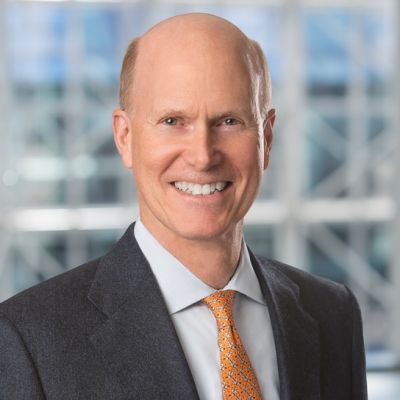About the Program
Many new lawyers learn business practices and culture the hard way — on the job. Others enroll in combined J.D.-MBA programs, requiring an additional year of study. Virginia offers a third way: The John W. Glynn Jr. Law & Business Program, which builds a bridge between law school and the real problems encountered in business law practice. By integrating business and legal analysis into the law school classroom, the program better prepares students to serve their future clients from day one.
The program is designed for students aspiring to structure and negotiate business transactions, advise company directors and management, represent businesses in litigation and disputes, begin their careers in a corporate position, or serve in government regulatory agencies. The program educates students about the needs and goals of commercial and financial services clients, the concepts and skills needed to guide those clients, and the importance of problem-solving. Students who participate in the program gain experience with the sophisticated and challenging projects they will encounter in their careers.
The study of business law is intellectually engaging and challenging. It prompts us to evaluate the appropriate role of government regulation and mandatory legal rules versus private ordering, default rules and self-regulation. It raises questions about how legislatures and courts address the relationship of the profit motive and other community interests, and it requires consideration of the allocation of risk and responsibilities among private parties, and the conflicting needs and demands of those parties. It gives students an understanding of why businesses behave as they do and prepares students to advise clients about business plans that comply with the law and are socially responsible.
The Law & Business Program provides opportunities to all law students. It is not a separate “track” and does not lead to a separate degree or certificate or a combined J.D./MBA. Instead, the program provides a chance for all students to build skills that many employers are seeking.
Lee C. Buchheit
Lenders are perfectly free to decide for themselves whether, when, how, to whom and on what terms they will extend credit to a sovereign borrower. But...
We examine the legal terms in the market for green bonds, debt instruments in which proceeds are earmarked, directly or indirectly, for projects with...
Tara Chowdhury
Faith Chudkowski
Amanda Gray Dixon
...Consequential damages have been a cornerstone of contract doctrine since the broken crankshaft in Hadley v. Baxendale. And the Hadley rule is one of...
In this article, we examine the relations between risk, the choice of foreign or local contract terms (parameters), and maturity in the sovereign debt...
We examine the legal terms in the market for green bonds, debt instruments in which proceeds are earmarked, directly or indirectly, for projects with...
Modern antitrust law has come under intense criticism in recent years, with a bipartisan chorus of complaints about the power of technology and...
Faculty Director(s)
Jay Butler
Joseph W. Dorn Research Professor of Law
Director, John W. Glynn Jr. Law & Business Program
Lee C. Buchheit
Lenders are perfectly free to decide for themselves whether, when, how, to whom and on what terms they will extend credit to a sovereign borrower. But...
We examine the legal terms in the market for green bonds, debt instruments in which proceeds are earmarked, directly or indirectly, for projects with...
Tara Chowdhury
Faith Chudkowski
Amanda Gray Dixon
...Consequential damages have been a cornerstone of contract doctrine since the broken crankshaft in Hadley v. Baxendale. And the Hadley rule is one of...
In this article, we examine the relations between risk, the choice of foreign or local contract terms (parameters), and maturity in the sovereign debt...
We examine the legal terms in the market for green bonds, debt instruments in which proceeds are earmarked, directly or indirectly, for projects with...
Modern antitrust law has come under intense criticism in recent years, with a bipartisan chorus of complaints about the power of technology and...
Contract law has one overarching goal: to advance the legitimate interests of the contracting parties. For the most part, scholars, judges, and...
Mark Moller
Federal courts control an outsize share of big-ticket corporate litigation. And that control rests, to a significant degree, on the Supreme Court’s...
More
Michael S. Knoll
Politics in the United States is ever more divided, stymying federal legislation. States have responded to this political polarization and...
National security review of corporate transactions has long been a relatively sleepy corner of regulatory policy. But as governments merge economic...
A key question in the academic and policy debates over the optimal architecture for sovereign debt has long been whether sovereigns should be given...
Contract law scholarship has devoted considerable attention to understanding how contract terms are designed to properly incentivize parties to...
This article studies the impact of exogenous legal change on whether and how lawyers across four different deal types revise their contracts’...
The most important phenomenon in the corporate world today is the swift and dramatic rise of the Environmental, Social, and Governance (“ESG”)...
In August of 2021, the American Society for Reproductive Medicine published its most recent opinion on the financial compensation of oocyte (egg)...
More
In 2018 the U.S. government announced that Chinese espionage was occurring in university research labs, and the Department of Justice subsequently...
Lee C. Buchheit
All sovereign debt restructurings are inherently messy, expensive, exasperating, time-consuming and contentious. These are the familiar pathologies in...
This Article examines the legal issues underlying hundreds of lawsuits, claiming unjust enrichment or breach of contract, brought by students who paid...
Patrick Bolton
Lee C Buchheit
Beatrice Weder di Mauro
...Contributions to solving the globe’s environmental crisis are properly expected to come from every country to a greater or lesser degree depending on...
Why do parties—even sophisticated ones—draft contracts that are vague or incomplete? Many others have tackled this question, but this Article argues...
Kim Oosterlinck
Ugo Panizza
Mark C. Weidemaier
... In 1825, France conditioned its grant of recognition to the new nation of Haiti on the payment of 150 million francs plus trade benefits. The payments...
More
Matthew Jennejohn
Who is the intended audience of a contract? A court, who may be called upon to resolve a dispute, is one audience. Another is commercial communities...
Since the 1990s, women have made up roughly half of law school classes. Attrition between entry to law firms and partnership results in women...
Paolo Colla
An implication of the incompleteness of contracts is that there are going to be gaps and ambiguities that either side can exploit. We ask whether the...
The moral case for diversity in businesses is compelling. The business case for diversity (that “diverse companies do better”) is mixed: studies in...
More
Lee Epstein
A decade and a half into its life, we ask: How pro business is the Roberts Court? Using a simple objective measure – how often does business win in...
In Ohio v. American Express, both the majority and dissent injected into Supreme Court jurisprudence a new test for evaluating restraints under the...
Bruno Zeller
International commercial law conventions (or “transnational law”) increasingly have become the legal device of choice regulating international...
Recent Supreme Court decisions have severely curtailed the reach of the Alien Tort Statute (ATS), making it nearly impossible to hold multinational...
More
Scholars and policy makers have long debated whether corporations should serve social purposes at the expense of shareholder wealth. The SEC has...
More
Few issues have aroused more interest of late than the role of “platforms” in the economy. The Supreme Court has recently made the what is likely to...
Ugo Panizza
Unnoticed in the literature on sovereign bonds, an innovation has been taking place over the past decade and a half. Starting with a single issuance...
Adriana Robertson
The rise of index funds has reshaped the modern American capital markets. Like mutual fund managers, indices now direct trillions of dollars of...
William Birdthistle
In Hughes v. Northwestern University, the Supreme Court is set to address “Whether allegations that a defined-contribution retirement plan paid or...
More
Although empirical scholarship dominates the field of law and finance, much of it shares a common vulnerability: an abiding faith in the accuracy and...
We analyze the price effect of the introduction of Collective Action Clauses (CACs) in newly issued sovereign bonds of Eurozone countries as of...
Corporations have received growing criticism for their role in climate change, perpetuating racial and gender inequality, and other pressing social...
This monograph reviews the academic literature that analyzes securities regulation from an economic perspective. It begins by describing the...
More
Corporations are increasingly important actors in international law. But, vital questions underlying this development have long gone unanswered: how...
Marcel Kahan
The standard paradigm of contracting assumes that parties will revise subsequent contracts if a court interpretation of a clause does not reflect...
The economic harm being caused by the novel coronavirus may soon result in multiple sovereign debtors moving into default territory. But the...
Contract law and theory have traditionally paid little attention to the processes by which contracts are made. Instead, contracts among sophisticated...
David A. Hoffman
When private parties perform contracts, the public bears some of the costs. But what happens when society confronts unexpected contractual risks...
The black letter law says that money damages are the preferred remedy for contract breach under US law. Specific performance is reserved for...
The traditional framework of U.S. private law that every first-year student learns is that contracts and torts are different realms: contracts is the...
Major index fund operators have been criticized as ineffective stewards of the firms in which they are now the largest shareholders. While scholars...
Eric Talley
An emerging consensus in certain legal, business, and scholarly communities maintains that corporate managers are pressured unduly into chasing short...
Over the past half century, the SEC’s regulations have become key determinants of the way in which stocks trade and the fees that exchanges charge for...
Americans collectively save hundreds of billions of dollars for their children’s education in Section 529 college savings plans. These plans are...
How do transactional associates add value to deals? Other scholars have characterized transactional lawyers as transaction cost engineers, regulatory...
Yaron Nili
For last two decades, scholars, judges, and corporations have embraced the idea that corporations should maximize benefit for shareholders. But on a...
Investors use research provided by broker-dealers, also known as sell-side research, to help formulate trading ideas and strategies. Investors...
Yaron Nili
Corporations have something to say about some of the most important social and economic issues of our time—and one way they say it is through shadow...
Nathaniel Pattison
Combining case-level data on all consumer bankruptcies in the last decade with changes in states' homestead exemption levels, we estimate how...
How can compliance be tested? Corporations must comply with a dizzying array of laws and regulations. To accomplish this complex task, corporations...
Over the past half century, the SEC’s regulations have become key determinants of the way in which stocks trade and the fees that exchanges charge for...
Mark Moller
Article III grants confers the judicial power of the United States over controversies between "citizens" of different states. In Section 1332(c) of...
Lee C. Buchheit
Argentina is once again seeking to restructure its external debt. To facilitate this process, the country is proposing to use the state-of-the-art...
The phenomenon of “sticky boilerplate” causing inefficient contract terms to persist exists across a variety of commercial contract types. One...
During the European sovereign debt crisis of 2011-13, some nations faced with rising borrowing costs adopted commitments to treat bondholders as...
Ugo Panizza
For over a century, legal scholars have debated the question of what to do about the debts incurred by despotic governments; asking whether...
Can Airbnb enforce international law? Should it? This Article argues that the answer to these questions may sometimes be yes and that many other...
A much-debated question in contract law scholarship is what the optimal measure of damages for breach should be. The casebook answer, drawing from...
This study examines how frequently firms restate when they materially misstate their financial statements using stock option backdating as the setting...
More
Yesterday’s EU General Court decisions in Starbucks and Fiat represent major victories for the Commission and its theory of state aid, notwithstanding...
Robert L. Rabin
The United States is on the verge of a new era in transportation, requiring a new legal regime. Over the coming decades, there will be a revolution in...
Proxy access, a long debated governance measure, was directed at reducing shareholder costs in nominating directors. However, since it was first...
The concept of checks and balances is a core tenet of our democracy; we fear letting any single institution become overly powerful or insufficiently...
In North Carolina State Board of Dental Examiners, the Court refused to exempt the board from the second element of Parker immunity (active...
In a series of recent cases, the Supreme Court has vigorously applied the presumption against extraterritoriality to curtail the territorial reach of...
One of the signature rulemaking initiatives of the Obama administration was the Fiduciary Rule, which redefined the relationship between retirement...
Leopoldo Parada
Member States increasingly use classifications based on company size in their tax laws. Because bigger companies are more likely to be foreign, this...
U.S. technology companies are increasingly standing as competing power centers that challenge the primacy of governments. This power brings with it...
In deals, parties sometimes enter into agreements that look like contracts but lack the legal bite of formal contracts. What value can these...
Standard contract terms are “sticky”: they rarely change, even if change appears to be in the parties’ interest. Multiple theories to explain...
Why do almost all sovereign nations list their international bonds on stock exchanges? We examine several hypotheses for what drives sovereigns to...
When Ebola came to West Africa in 2014, Liberia could not cope. The State’s already fragile public health infrastructure was largely ineffective in...
Lauren Edelman’s "Working Law" is remarkably relevant to the study of financial regulation. In particular, three factors that Edelman identifies as...
Gabriel V. Rauterberg
The U.S. equity markets have undergone profound changes since the late 20th century. Electronic order books have almost entirely replaced manual floor...
One of the most disputed policy initiatives of the Obama administration was the Department of Labor’s fiduciary rule, which subjects brokers and...
The conventional wisdom in corporate law posits that private ordering has an important virtue: it allows firms to efficiently tailor governance terms...
More
In this sixth and final installment in a series of reports on state aid, Mason evaluates the European Commission’s decisions in the recent state aid...
More
This article, prepared for a symposium on Benjamin N. Cardozo: Judge, Justice, Scholar, examines Judge Cardozo’s opinion in Sun Printing &...
A healthy system of shareholder voting is crucial for any regime of corporate law. The proper allocation of governance power is subject to debate...
Courts have developed a series of controversial doctrines that allow a debtor to depart from bankruptcy’s standard priority rules. In a recent...
Many popular and academic commentators identify deregulation as a cause of the 2007-08 financial crisis. Some argue that the Gramm-Leach-Bliley Act...
Robert Brauneis
Who is the author in copyright law? Knowing who our copyright system currently incentivizes to create which works is a necessary precondition for...
The reliance on domestic sales law in interpreting the CISG’s provisions has been noted and condemned by commentators and some courts. Seldom...
Section 36(b) of the Investment Company Act permits mutual fund investors to sue funds for charging excessive asset management fees. This liability...
Leopoldo Parada
We argue that the high revenue triggers in proposed digital taxes — including the recent Franco-German proposal for a digital advertising tax — may...
This article describes Wayfair and provides some cautions about what it means for the U.S. states and the rest of the world, especially Europe. It...
Matthew Jennejohn
Modern commercial contracts - those governing mergers & acquisitions and financial derivatives, for instance - have become structurally complex and...
Why do parties use non-binding agreements? This Article explores the role of nonbinding preliminary agreements in mergers and acquisitions (M&A) deals...
Marcel Kahan
Exit provisions have long been a sleepy and uncontroversial part of the corporate bond boilerplate. That changed in September 2016, with the...
Lee C. Buchheit
The prospect of the potential mischief that may be caused by holdout creditors in a Venezuelan sovereign debt restructuring is probably the main...
Standard contract doctrine presumes that sophisticated parties choose their terminology carefully because they want courts or counterparts to...
This paper argues that director interlocks, a phenomenon in which directors sit on more than one corporate board, ought to be an object of expanded...
This essay argues that management's resistance to majority voting bylaws (MV), could have caused an omitted-variable bias in testing MV effects on...
This chapter in the Oxford Handbook of Law and Economics offers an economic theory of how the law of agency and partnership facilitates economic...
Pay arrangements for managers of public corporations typically include substantial amounts of compensation deferred through non-qualified retirement...
This article sets out the case for repealing the $1 million tax cap on executive pay. The cap is easily avoided and, when not avoided, widely...
Michael S. Knoll
Last Term, a sharply divided Supreme Court decided a landmark dormant Commerce Clause case, Comptroller of the Treasury of Maryland v. Wynne. Wynne ...
This is Part three in a multi-part Special Report on state aid. It provides detailed analysis and critical commentary on the EU Commission's recent...
More
In this report, the second in a series of reports on EU state aid, Mason evaluates the claims Treasury’ made in its White Paper that recovery in the...
More
In this fourth part in a series of reports on state aid, Mason focuses on the element of “advantage” in EU state aid law, and she criticizes the...
Does the ontology of corporations matter for corporate rights? Much of the philosophical literature on corporate rights centers on ontological...
Rote use of a standard form contract term can erode its meaning, a phenomenon made worse when the process of encrustation introduces various...
Todd Zywicki
The Consumer Financial Protection Bureau’s Arbitration Study: Report to Congress 2015 does not support the case for ex ante regulation of mandatory...
K. J. Cremers, Martijn
Actively managed mutual funds sell the potential to beat the market by picking stocks that are expected to outperform passive benchmarks like the S...
For more than a century, the commercial law of intellectual property has generated intense controversy with ever-growing stakes. The central fulcrum...
The system of residential mortgage contact regulation enacted by the 2010 Dodd Frank Wall Street Reform and Consumer Protection Act of 2010 has been...
Government actions taken during and in the wake of the Financial Crisis of 2008 have generated lawsuits that, somewhat unexpectedly, have made takings...
Can we meaningfully speak of a church’s right to conscience or a corporation’s right to religious liberty? One way to approach this question is by...
Why are some bargains memorialized in dozens of related agreements, rather than one definitive agreement? This Article uses mergers and acquisitions...
Stephen J. Choi
In March 2012, Greece conducted one of the biggest and most brutal sovereign debt restructurings ever, asking holders of Greek government bonds to...
This paper argues that director interlocks, a phenomenon in which directors sit on more than one corporate board, ought to be an object of expanded...
Despite extensive theoretical and empirical literature several puzzles remain regarding the market for corporate law: Why many firms do not choose...
This essay was written for the Saint Louis Law Journal’s forthcoming issue on Teaching Business Associations. The essay describes how one might...
Notwithstanding ERISA’s fiduciary requirements, a significant portion of 401(k) plans establish investment menus with options that predictably lead...
We identify a number of serious mechanical flaws in the statutes and judicial doctrines that organize fee liability for mutual fund managers...
Some bankrupt municipalities have proposed plans of reorganization that offer substantially greater recoveries to their active workers and retirees...
People are often ignorant about the legal rules that govern the most common transactions in their lives. This article analyzes one common regulatory...
In a corporate inversion, a U.S.-incorporated taxpayer renounces its status as a U.S. corporation and becomes incorporated, for tax purposes, in a tax...
Benjamin P. Edwards
In recent years, federal courts have heard, without clear subject matter jurisdiction, contract disputes involving billions of dollars worth of...
Guangya Liu
Today, more than five years after Dodd-Frank was first signed into law, uncertainty surrounds many aspects of the Volcker Rule’s application and...
Over the course of the twentieth century, the effect of state boundaries as hard-and-fast limits on judicial and legislative jurisdiction steadily...
Building on the U.S. Supreme Court’s recent decision in Jones v. Harris Associates, this paper presents the first comprehensive empirical study of...
Foreclosure procedures in some states are considerably swifter and less costly for lenders than in others. In light of the foreclosure crisis, an...
Shareholder derivative litigation differs from other types of representative lawsuits because a lead plaintiff does not purport to stand in for an...
The claim that lawyers act as gatekeepers or certifiers in financial transactions is widely discussed in the legal literature. There has, however...
This symposium essay summarizes our ongoing ethnographic research on corporate board diversity, discussing the central tension in our respondents’...
This Article argues that “noise adopters,” namely firms whose corporate governance is determined by non-substantive factors such as attorneys’...
The ethics rules governing lawyers include a number of rules banning contact between lawyers and nonclients. These “no-contact” rules are rarely...
Early corporate law scholarship argued both that anti-takeover devices are inefficient (they reduce the value of the firm) and that firms adopt...
Antitrust is today viewed almost exclusively in strictly economic terms. Under the nearly ubiquitous “rule of reason,” conduct is condemned or saved...
This paper -- part of William & Mary's recent symposium on "Law Without a Lawmaker"-- tries to provide a concise but comprehensive analysis of Justice...
This article explores the background to, and significance of, the Russian renationalization of the Yukos energy conglomerate through a tax assessment...
Sovereign loans involve complex but largely standardized contracts, and these include some terms that no one understands. Lawyers often account for...
This Article describes the results from fifty-seven interviews with corporate directors and a limited number of other persons (including...
This Article exposes and analyzes the rise of Nevada as an almost liability-free jurisdiction. Without much public attention, Nevada has embarked on a...
At the bottom of the financial crisis lie failed contracts. Failed contracts are the stuff of contract law. Yet most discussions to date of possible...
The law of third party beneficiaries considers whether an outsider can sue for damages on a contract formed by others. Some might believe that...
In the 1920s and 1930s, many public utilities in the United States were controlled by holding companies organized in pyramid form. This structure can...
The Supreme Court's decision denying certification of a class action in Wal-Mart Stores, Inc. v. Dukes elicited a strong dissent from Justice Ginsburg...
Contract scholarship has given little attention to the production process for contracts. The usual assumption is that the parties will construct the...
This essay will appear as an entry in the forthcoming Encyclopedia of Law and Economics (2d ed.), published by Edward Elgar. The essay surveys the...
The division of power between majority and minority shareholders raises a fundamental tension for corporate law scholars. Awarding minority owners...
In recent years, scholars have devoted considerable attention to transnational networks of financial regulators and their efforts to develop uniform...
This report examines the case law and statutory history of the terms "partner" and "partnership," including the seminal Supreme Court cases of the...
The Hofstra Law Review has organized an “Ideas” symposium around our book manuscript “The Three and a Half Minute Transaction” (see http://ssrn.com...
Patrick S. Shin
Diversity initiatives are commonplace in today’s corporate America. Large and successful firms frequently tout their commitments to diversity...
In this article, we report the results of a series of interviews with corporate directors about racial, ethnic, and gender diversity on corporate...
In this Article, we report and analyze the results of forty-six wide-ranging interviews with corporate directors and other relevant insiders on the...
How the myriad bank regulatory agencies, including the Fed, SEC, FDIC, OCC, helped unleash the banks to create more and more destructive derivatives...
Conventional wisdom, supported by theory and evidence, has it that the franchise tax plays an important role in shaping Delaware corporate law.The...
This essay will appear as a chapter in a forthcoming book entitled Fault in American Contract Law, to be published by Cambridge University Press and...
Despite the widespread media focus on business outsourcing transactions, we only have a limited understanding of how firms actually select a...
Significant intellectual and financial resources have been committed to decentralization projects in the developing world based on the idea that...
Unlike shareholders of ordinary companies, mutual fund shareholders do not sell their shares - they redeem them from the issuing funds for cash. We...
Diverse measures are used as proxies for judicial ability, ranging from the college and law school a judge attended to the rate at which her decisions...
This Article is the first to examine systematically state antitakeover law outside Delaware. It conducts a research of all available cases to find...
The United States generally imposes two levels of federal income tax on corporate profits. The first level taxes income to the corporation; the second...
Corporate law largely addresses three basic relationships: shareholder versus manager; shareholder versus non-equity investor (such as creditor); and...
This article explores the growth of business outsourcing, how it works, and why two firms might logically enter into an outsourcing arrangement not...
Given the existence of contract, property, fraud, and company law, what is the purpose of securities laws? Broadly speaking, they can serve either of...
Anna Gelpern
This essay highlights a phenomenon that has no place in the conventional theory of sophisticated business contracts: the term that makes no sense as...
The "rogue trader" - a famed figure of the 1990's - recently has returned to prominence due largely to two phenomena. First, recent U.S. mortgage...
Double taxation of corporate profits distorts the choice of business form, the debt and equity capitalization of companies, and the character and...
This Article illuminates the interdependence between the structure of Delaware's franchise tax and Delaware's corporate law. It makes three major...
The study of contract law is undergoing a difficult transition as it moves from the theoretical to the empirical. Over the past few decades scholars...
The information revolution has made America more dependent on its electronic communications infrastructure than ever before. In additional to the...
This article addresses the timely yet persistent question of how best to regulate access to telecommunications networks. Concerns that private firms...
Anthony Gambino
This paper develops a typology of different country governance contexts, in which we propose four broad categories of countries in Sub-Saharan Africa...
Lissa Lamkin Broome
The ethnic and gender make-up of corporate boards has been the subject of intense public and regulatory focus in many countries, including the United...
Daniel I. Halperin
The tax rules governing deferred compensation, codified at section 409A, are harsh and complex. The rules are focused on the least important policy...
Heinz's wholly owned subsidiary purchased on the market over $131 million worth of Heinz's common shares. A few months later, the subsidiary sold 95%...
Since 1999, the US Department of Justice has had a policy that the government may consider a corporation’s willingness to waive its attorney-client...
How important are active independent shareholders in a framework for sound corporate governance? Hedge funds, institutional investors, the "Warren...
Why has business outsourcing increased so rapidly over the past decade? The question is important for corporate law scholars because it raises...
Although extralegal enforcement is widely acknowledged, the conventional understanding of written contract provisions, such as the complex and...
Daniel Klerman
Recent empirical work shows that countries whose legal systems are based on English common law differ systematically from those whose legal systems...
This paper develops a model of the competition among states in providing corporate law rules. Such competition is shown to produce optimal rules with...
This Article conducts an empirical experiment to shed light on a simply stated, but vexing, question in contract law: What is the optimal precision of...
Stephen J. Choi
Using a dataset of sovereign bond offering documents and underlying bond contracts for ten sovereign issuers from 1985 to 2005, we examine the...
Stephen J. Choi
Formalists contend that courts should apply strict textual analysis in interpreting contracts between sophisticated commercial parties...
In this article, Professor Yale reviews the contingent liability tax shelter employed by Black & Decker, and critiques the arguments the government...
Should an employer be able to enjoin an employee from working for a competitor when the employee did not sign a non-competition agreement? Under the...
More
Within intellectual property, Darcy v. Allen and the Statute of Monopolies are frequently, almost reflexively, invoked as establishing a baseline norm...
Using a hand collected new data set, this paper examines in detail a classic account of stock market manipulation - the stock pools of the 1920s...
Daniel M. Klerman
This paper assesses the impact of judicial independence on equity markets. North and Weingast (1989) argue that judicial independence and other...
In this Article, the author analyzes the reactions of 147 New York City law firms to the 1994 enactment of the New York Limited Liability Partnership...
This article demonstrates that, at least since the adoption of the Organizational Sentencing Guidelines in 1991, the United States legal regime has...
This report is a comprehensive explanation of the final INDOPCO regulations and corresponding changes to regulations under sections 167 and 446. The...
In Free Culture: How Big Media Uses Technology and the Law to Lock Down Culture and Control Creativity, Lawrence Lessig warns that the health of the...
This article critically examines the use of single-observation case studies to develop causal explanations for significant legal events, detailing the...
In securities-fraud cases, courts routinely admonish plaintiffs that they are not permitted to rely on allegations of "fraud by hindsight." In effect...
Between 1911 and 1931, 47 of the 48 states adopted state securities, or "blue sky," laws. This paper employs an event history analysis to analyze...
Stephen M. Bainbridge
Judicial opinions in securities fraud class actions frequently do not conform to standard theories of adjudication. Instead of the complex modes of...
Across a range of legal regimes - including environmental, tort, employment discrimination, corporate, securities, and health care law - United States...
This essay discusses two recent episodes in the financial derivatives industry and the television coverage of those episodes. Our discussion focuses...
Whether and how the federal securities laws should restrict insider trading is one of the most hotly debated topics in the securities law literature...
The majority shareholder in a closely held corporation may use its control of the corporate machinery to appropriate wealth from the minority, and it...
When a government contracts with a private firm to supply a service previously supplied by the government, questions arise as to whether the private...
In this article, I analyze the motivations underlying the actions of "rogue traders" - market professionals who engage in unauthorized purchases or...
Mark Weinstein
The appraisal remedy affords a shareholder the option redeem her shares for cash in the event of certain corporate actions, such as mergers. While...
This paper challenges the conventional wisdom that unification and harmonization of international commercial law is desirable and should be pursued...
Although some have praised United States v. O'Hagan for bringing coherence and stability to the federal insider trader regime, the case actually...
The law of agency is one of the basic building blocks of business. Agents facilitate transactions between firms and structure governance relations...
Every public offering of securities is necessarily made some time during a fiscal quarter. Companies are obliged to disclose fall quarter operating...
Corporate America considers risk management vitally important and considers derivative financial products an indispensable tool for managing many...
The United States Supreme Court validated the misappropriation theory in United States v. O'Hagan, but unfortunately rendered a confusing opinion...
Berkshire Hathaway's reporting practices are different than those of other American public companies. Bershire Hathaway provides separate and...
A common debate among securities lawyers, regulators and professionals is whether and to what extent the internationalization of securities markets...
This paper argues that the implications of information technology for the regulation of securities are more limited than has often been claimed. It...
The large losses suffered by investors in financial derivatives during recent years have prompted a wave of litigation, as well as proposals from...
Resident Faculty
Resident Faculty
Torts and insurance law
Corporate law and corporate finance
Corporations, securities and real estate law; consumer financial markets
Tax policy, legislative process and legal ethics
Intellectual property, patents, administrative law
Law and economics, quantitative methods/statistics in the law
Race and law, constitutional law, employment discrimination
Tax law and policy, behavioral economics
Corporations, mergers and acquisitions, and deals
Bankruptcy and consumer finance law
Corporate law and securities, industrial and intellectual property, economic regulation and history
Law and economics, international relations, international law, immigration and refugee law, judging
Contracts, property and real estate; critical race theory
Contracts and corporations, nonprofit organizations, bankruptcy
Environmental law and climate change, administrative law
Property, corporations and land conservation, nonprofit organizations
Corporations, securities regulation, contracts
Constitutional law, antitrust and communications regulation, national security
Intellectual property, law and economics
Employment discrimination, civil rights and admiralty, civil procedure and international civil litigation
International law, business and economics
International law and business, financial regulation
Employment law and discrimination, contracts, contract theory, law and economics
Contracts, sales/commercial paper, legal philosophy, bankruptcy and secured transactions
Tax policy, tax shelters, federal taxation
State, international taxation and policy
Securities, corporate and derivatives law, taboo markets
Sovereign debt
International law, corporations, contracts, corporate social responsibility
Business law, contract theory, mergers and acquisitions
Legislation, election law, law and economics, and direct democracy
Administrative law, constitutional law and history
Other Faculty
Criminal law and criminal procedure
Courses
The following is a list of courses offered during the current and two previous academic years. Numbers in parentheses indicate which academic year(s) the courses were offered, i.e., 2021-22 is coded (22), 2022-2023 is coded (23) and 2023-24 is coded (24).
See a Sample Course Schedule
Accounting: Understanding and Analyzing Financial Statements (22,23,24)
Admiralty (SC) (22,24)
Advanced Contracts (22)
Advising Boards of Directors (Public and Private Equity) Under Siege (SC) (22,23,24)
Agency, Partnership and the LLC (22,24)
Airline Industry and Aviation Law (22)
Antitrust (22,23,24)
Antitrust Review of Mergers in a Global Environment (22,23,24)
Banking and Financial Institutions (22,23,24)
Bankruptcy (23,24)
Bankruptcy (Law & Business) (22,23)
BigLaw and the Profession (and Business) of Law (22,23,24)
Business and Governmental Tort Liability (23)
Business Planning (22,23,24)
Business Reorganization Under Chapter 11 of the Bankruptcy Code (22)
Chinese Law (SC) (23,24)
Copyright Law (22,23,24)
Complex Commercial Contract Negotiations (22,23)
Corporate Finance (22,23,24)
Corporate Law as Innovation (SC) (24)
Corporate Litigation in the Delaware Court of Chancery (SC) (23,24)
Corporate Social Responsibility Seminar (22)
Corporate Strategy (SC) (22,24)
Corporate Transactions: Startup to Exit (SC) (22,23,24)
Corporations (22,23,24)
Corporations (Law & Business) (22,23,24)
Corporations, Investors and ESG (22,23,24)
COVID and Contracts: Courts, Regulation and Drafting (SC) (22)
Critical Perspectives in Business Law (22)
Cryptocurrency Law and Policy (SC) (22,23,24)
Deals (23)
Derivatives Markets and Their Regulation (22)
Emerging Growth Companies and Venture Capital Financing: Principles and Practice (22,23,24)
Emerging Markets: Principles and Practice (22,23,24)
Energy and Environmental Products Trading and Commodities Regulation (SC) (22,23)
European Union Law (SC) (24)
Federal Regulation of Investment Companies (SC) (22,24)
Franchise Law (23)
Government Contract Law (22,23,24)
Global Business and International Corruption (SC) (22,23,24)
Global Contracting: A Case Study (SC) (23,24)
Inside the Boardroom (SC) (22,23,24)
Insurance (22,23)
International Business Negotiation (23,24)
International Business Transactions (22,24)
International Debt Transactions (22,23)
Internet Law (22,23)
Introduction to Law and Business (22,23,24)
Introduction to the Law of Trade Secrets (SC) (22)
Israeli Business Law and Innovation (SC) (23)
Law and Business Colloquium (24)
Law of Public-Private Partnerships (22,23,24)
Leadership and Team Management (SC) (23)
Legal Issues in Corporate Finance (Law & Business) (22,24)
Legal Practice and the Startup Company: An Inside Look (SC) (22,23,24)
Litigation Skills and Professional Liability Law (22,23,24)
Management of BigLaw Firms: Balancing Culture and Profits (SC) (22,23,24)
Mergers and Acquisitions (22,23,24)
Modern Real Estate (22)
Negotiating a Joint Venture in China (SC) (22,23)
Nonprofit Organizations (22,23,24)
Nonprofit Organizations: Principles and Practice (22,23,24)
On Purpose: An Introduction to Leadership, Decision-making and Culture (24)
Patent Law (22,23,24)
Personal Data Protection in Europe (SC) (23)
Public M&A Negotiation (SC) (23)
Real Estate Transactions and Litigation (22,23,24)
Regulatory Law and Policy (22,23)
Repugnant Transactions (22,23,24)
Rise of ESG in Corporate Law and Governance (SC) (23)
Secured Transactions (22,23,24)
Securities Litigation and Enforcement (22,23,24)
Securities Regulation (22,23,24)
Securities Regulation (Law & Business) (22,23,24)
Startup of a Medtech Company (SC) (22)
Survey of Patent, Copyright, Trademark (22,23,24)
The Business of Banking and Prudential Regulation (SC) (22,23,24)
The Corporate Law of HBO’s “Succession” (SC) (22)
The In-House Lawyer: Duties and Tensions (SC) (24)
Topics in Banking and Financial Regulation (24)
Topics in Private Company Acquisitions (SC) (22,23,24)
Topics in Public Equity Investing (SC) (22,23)
Transactional Approach to Mergers and Acquisitions (22,23,24)
Transactional Law: Drafting, Communication and Negotiation (22,23,24)
Truth, Lies and Statistics for Lawyers (SC) (22)
When Financial Contracts Blow Up (SC) (24)
Wine and the Law (23)
CLINICS
Advanced Community Solutions Clinic (22,23,24)
Community Solutions Clinic (22,23,24)
Economic and Consumer Justice Clinic (YR) (22,23,24)
Entrepreneurial Law Clinic (22,23,24)
Nonprofit Clinic (YR) (22,23,24)
David Tejtel, a 2007 graduate of the University of Virginia School of Law, helped successfully challenge Elon Musk’s $56 billion pay package in February.
Washington and Lee University professor Carliss Chatman; Chuck Cory ’82, former chairman of technology banking at Morgan Stanley; UVA Law professor Cathy Hwang; and Freshfields Bruckhaus Deringer Senior Counsel Peter Lyons discuss Tesla and SpaceX CEO Elon Musk’s rapid takeover of Twitter and what’s next. The event was sponsored by the John W. Glynn, Jr. Law & Business Program.
Curriculum
Students can take advantage of an extensive set of curricular opportunities that allow them the flexibility to sample according to their interests or dive deep.
- Business Methods and Skills
- Core Business Law Courses
- Enhanced Core Law & Business Courses
- Advanced Courses
- Sample Course Schedule
- J.D.-M.B.A. Program
- Frequently Asked Questions
Business Methods and Skills
For students without a background in basic finance, accounting or other business methods, courses taught by UVA’s business and law faculty lay a foundation for understanding the corporate world. They include Accounting and Corporate Finance, Corporate Strategy and other classes focused on business skills.
Core Business Law Courses
Core business law courses include Corporations, Securities Regulation, Bankruptcy, Employment, Environmental Law, Income Tax, Antitrust and Intellectual Property.
Enhanced Core Law & Business Courses
Students who have taken the introductory Accounting and Corporate Finance course or who have equivalent experience are eligible to take enhanced versions of core Law & Business courses that incorporate finance and quantitative concepts. These typically include Corporations, Securities Regulation, Secured Transactions, Corporate Finance, and Mergers and Acquisitions, which are often taught by resident faculty members with graduate degrees in economics or finance.
Sample Course Schedule
First Year
FALL
Civil Procedure* (4 credits)
Contracts* (4)
Criminal Law* (3)
Legal Writing* (1)
Torts* (4)
SPRING
Constitutional Law* (4)
Legal Writing* (1)
Property* (4)
Corporate Finance (2)
Accounting (2)
Other Elective
* REQUIRED first-year curriculum
Second Year
FALL
Corporations
Securities Regulation (or spring semester)
Federal Income Tax
Administrative Law
Corporate Strategy
Negotiation Institute
SPRING
Bankruptcy
Secured Transactions
Intellectual Property, such as Survey of Patent, Copyright and Trademark
Antitrust
Other possibilities:
Employment or Labor Law, Banking, Environmental Law, Teamwork
Third Year
If you have a good idea of your interests or the areas of law in which you would like to practice, you should start to concentrate on more advanced courses in those areas, such as transactions, tax, securities, intellectual property, international or litigation. A list of courses recently offered is at the Curriculum and Advanced Courses website pages. Otherwise, select a mix of advanced courses from the transaction, litigation and regulatory areas.
Possibilities include:
Current Issues in Corporate Law
M&A
Real Estate Transactions
Advanced Topics in Securities Law
Private Equity and Hedge Funds
Entrepreneurial Law Clinic
Finance of Small Enterprises
Legal Issues in Corporate Finance
White Collar Criminal Defense
International Civil Litigation
Federal Regulation of Investment Companies
International Finance
International Tax
International Patent Law
Patent Clinic
The John W. Glynn Jr. Law & Business Program at the University of Virginia School of Law, which prepares graduates to enter the corporate world with advanced skills, is celebrating its 20th anniversary this year.
Berkeley Law School professor Abbye Atkinson and UVA Law professor Andrew Hayashi present research on how the law interacts with issues of race in business and finance, following an introduction by University of Chicago Law Dean Thomas J. Miles. Aneil Kovvali of the University of Chicago Law School moderated the event, which was sponsored by UVA Law’s John W. Glynn, Jr. Law & Business Program and the University of Chicago Law School’s Center on Law and Finance.
Courses
The following is a list of courses offered during the current and two previous academic years. Numbers in parentheses indicate which academic year(s) the courses were offered, i.e., 2021-22 is coded (22), 2022-2023 is coded (23) and 2023-24 is coded (24).
See a Sample Course Schedule
Accounting: Understanding and Analyzing Financial Statements (22,23,24)
Admiralty (SC) (22,24)
Advanced Contracts (22)
Advising Boards of Directors (Public and Private Equity) Under Siege (SC) (22,23,24)
Agency, Partnership and the LLC (22,24)
Airline Industry and Aviation Law (22)
Antitrust (22,23,24)
Antitrust Review of Mergers in a Global Environment (22,23,24)
Banking and Financial Institutions (22,23,24)
Bankruptcy (23,24)
Bankruptcy (Law & Business) (22,23)
BigLaw and the Profession (and Business) of Law (22,23,24)
Business and Governmental Tort Liability (23)
Business Planning (22,23,24)
Business Reorganization Under Chapter 11 of the Bankruptcy Code (22)
Chinese Law (SC) (23,24)
Copyright Law (22,23,24)
Complex Commercial Contract Negotiations (22,23)
Corporate Finance (22,23,24)
Corporate Law as Innovation (SC) (24)
Corporate Litigation in the Delaware Court of Chancery (SC) (23,24)
Corporate Social Responsibility Seminar (22)
Corporate Strategy (SC) (22,24)
Corporate Transactions: Startup to Exit (SC) (22,23,24)
Corporations (22,23,24)
Corporations (Law & Business) (22,23,24)
Corporations, Investors and ESG (22,23,24)
COVID and Contracts: Courts, Regulation and Drafting (SC) (22)
Critical Perspectives in Business Law (22)
Cryptocurrency Law and Policy (SC) (22,23,24)
Deals (23)
Derivatives Markets and Their Regulation (22)
Emerging Growth Companies and Venture Capital Financing: Principles and Practice (22,23,24)
Emerging Markets: Principles and Practice (22,23,24)
Energy and Environmental Products Trading and Commodities Regulation (SC) (22,23)
European Union Law (SC) (24)
Federal Regulation of Investment Companies (SC) (22,24)
Franchise Law (23)
Government Contract Law (22,23,24)
Global Business and International Corruption (SC) (22,23,24)
Global Contracting: A Case Study (SC) (23,24)
Inside the Boardroom (SC) (22,23,24)
Insurance (22,23)
International Business Negotiation (23,24)
International Business Transactions (22,24)
International Debt Transactions (22,23)
Internet Law (22,23)
Introduction to Law and Business (22,23,24)
Introduction to the Law of Trade Secrets (SC) (22)
Israeli Business Law and Innovation (SC) (23)
Law and Business Colloquium (24)
Law of Public-Private Partnerships (22,23,24)
Leadership and Team Management (SC) (23)
Legal Issues in Corporate Finance (Law & Business) (22,24)
Legal Practice and the Startup Company: An Inside Look (SC) (22,23,24)
Litigation Skills and Professional Liability Law (22,23,24)
Management of BigLaw Firms: Balancing Culture and Profits (SC) (22,23,24)
Mergers and Acquisitions (22,23,24)
Modern Real Estate (22)
Negotiating a Joint Venture in China (SC) (22,23)
Nonprofit Organizations (22,23,24)
Nonprofit Organizations: Principles and Practice (22,23,24)
On Purpose: An Introduction to Leadership, Decision-making and Culture (24)
Patent Law (22,23,24)
Personal Data Protection in Europe (SC) (23)
Public M&A Negotiation (SC) (23)
Real Estate Transactions and Litigation (22,23,24)
Regulatory Law and Policy (22,23)
Repugnant Transactions (22,23,24)
Rise of ESG in Corporate Law and Governance (SC) (23)
Secured Transactions (22,23,24)
Securities Litigation and Enforcement (22,23,24)
Securities Regulation (22,23,24)
Securities Regulation (Law & Business) (22,23,24)
Startup of a Medtech Company (SC) (22)
Survey of Patent, Copyright, Trademark (22,23,24)
The Business of Banking and Prudential Regulation (SC) (22,23,24)
The Corporate Law of HBO’s “Succession” (SC) (22)
The In-House Lawyer: Duties and Tensions (SC) (24)
Topics in Banking and Financial Regulation (24)
Topics in Private Company Acquisitions (SC) (22,23,24)
Topics in Public Equity Investing (SC) (22,23)
Transactional Approach to Mergers and Acquisitions (22,23,24)
Transactional Law: Drafting, Communication and Negotiation (22,23,24)
Truth, Lies and Statistics for Lawyers (SC) (22)
When Financial Contracts Blow Up (SC) (24)
Wine and the Law (23)
CLINICS
Advanced Community Solutions Clinic (22,23,24)
Community Solutions Clinic (22,23,24)
Economic and Consumer Justice Clinic (YR) (22,23,24)
Entrepreneurial Law Clinic (22,23,24)
Nonprofit Clinic (YR) (22,23,24)
David Tejtel, a 2007 graduate of the University of Virginia School of Law, helped successfully challenge Elon Musk’s $56 billion pay package in February.
Washington and Lee University professor Carliss Chatman; Chuck Cory ’82, former chairman of technology banking at Morgan Stanley; UVA Law professor Cathy Hwang; and Freshfields Bruckhaus Deringer Senior Counsel Peter Lyons discuss Tesla and SpaceX CEO Elon Musk’s rapid takeover of Twitter and what’s next. The event was sponsored by the John W. Glynn, Jr. Law & Business Program.
Advanced Courses
Typically offered in small seminar settings, advanced courses prepare students for real-world situations and teach students how to use the law to find constructive solutions to business problems. Top practitioners from law firms, business and government, as well as UVA faculty, engage students in hands-on exercises, such as deal-structuring, negotiating and counseling.
The following is a list of courses offered during the current and two previous academic years. Numbers in parentheses indicate which academic year(s) the courses were offered, i.e., 2021-22 is coded (22), 2022-23 is coded (23) and 2023-24 is coded (24).
Courses in recent years include:
THE CORPORATE LAW OF HBO’S “SUCCESSION” (22), taught by Professor Cathy Hwang and Peter Lyons, a legal consultant for the show. Lyons also teaches TRANSACTIONAL APPROACH TO MERGERS AND ACQUISITIONS (22,23,24).
CORPORATE STRATEGY (22,24) and LEADERSHIP AND TEAM MANAGEMENT (23), taught by Jim Donovan, vice chairman of global client coverage at Goldman Sachs.
COURSES ON INTERNATIONAL BUSINESS TRANSACTIONS that examine legal and regulatory structures affecting foreign investors seeking to participate in the development of “emerging markets,” taught by UVA Law professor Paul Stephan and Richard Dean, an experienced practitioner.
INTERNATIONAL BUSINESS NEGOTIATION (23,24), taught by Kenneth Starling, a retired DLA Piper partner and former official in the Justice Department’s Antitrust Division.
LEGAL PRACTICE AND THE STARTUP COMPANY: AN INSIDE LOOK (22,23,24), taught by Professor Quinn Curtis and entrepreneur and lawyer Rob Masri '96.
FEDERAL REGULATION OF INVESTMENT COMPANIES (22,24), taught by Robert Zack ’75, former general counsel of Oppenheimer Funds.
TOPICS IN PUBLIC EQUITY INVESTING (22,23), taught by Barney Wilson, founder and portfolio manager of Robious Capital.
Second-year students Chloe Chiles and Toni Woods won the ECVC Transactional Law Competition at the University of Virginia School of Law on Feb. 23.
UVA Law professor Kim Krawiec discusses her work on taboo transactions, such as commercial surrogacy, egg and sperm markets, organ donation and sex work. Risa Goluboff and Cathy Hwang host the episode.
Beyond the Curriculum
Students interested in business law have access to a variety of extracurricular activities.
- The Virginia Law & Business Review is one of only a few student-edited business law journals among top law schools. The review holds a conference on a current business topic each year.
- The Virginia Law & Business Society sponsors a variety of academic, professional and social activities for students interested in careers in law and business.
- Rivanna Investments is a student organization dedicated to learning the art of intelligent investing. It manages an investment portfolio.
The Law School also hosts speakers and conferences on business topics throughout the year, as well as an annual entrepreneurship competition (part of a broader UVA competition) with a cash prize.
Related Student Groups
Rivanna Investments offers University of Virginia School of Law students a unique opportunity to confront common investor issues and learn more about the corporate world.
The practice of investing in funds and companies that pay attention to environmental, social and corporate governance issues could be at a turning point, say UVA Law professors Quinn Curtis and Paul G. Mahoney.











































































